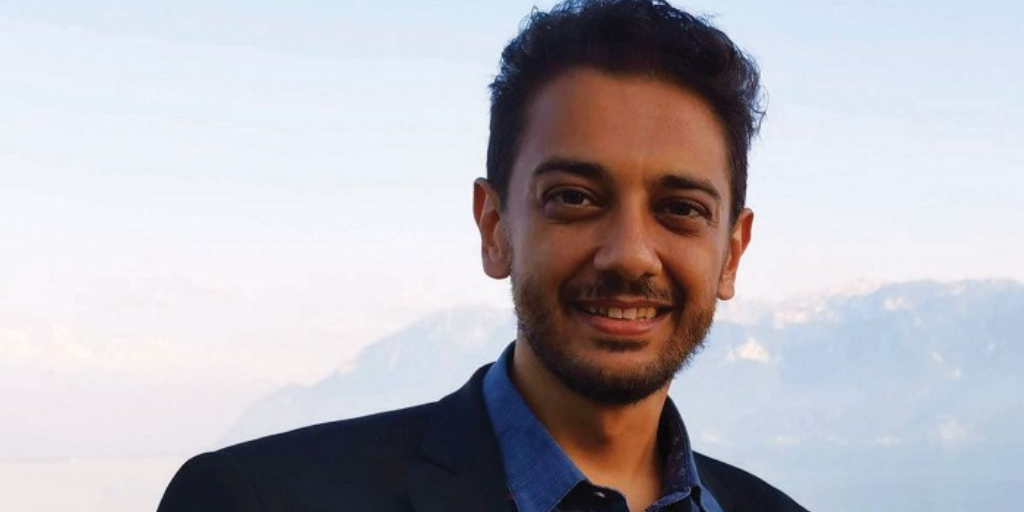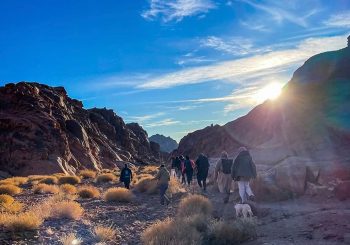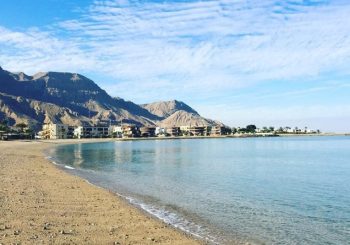Upon landing in Jordan to attend a conference on water sustainability in the Middle East in 2016, an aspiring science journalist overheard another passenger giving publishing directions right off the plane.
Intrigued, the next day she found out he was one of the speakers at the conference, and that he was a big deal in the world of science journalism. Taking a shot, she approached Mohammed Yahia, then Executive Editor of Nature Research in the Middle East, and asked for an internship. His unwavering reply came: of course!
A few weeks in, to her own astonishment, she was writing about carbon policies and taking phone calls with NASA.
Seven years later, the same journalist is starting her PhD in environmental communication, with the support of one of many recommendation letters Yahia wrote her. But heart-wrenching news came before she was able to tell him.
Yahia died on August 11th after a long battle with a rare form of bone marrow cancer, at the age of 41.
This story is that of the author’s, and it is in no way exceptional. Throughout his remarkable career, the expertise and generosity of long-time executive editor at Springer Nature and former president of the World Federation of Science Journalists helped shape countless minds.
“[Yahia] loved science communication and welcomed anyone to learn it. He offered all the knowledge he had to whoever asked for it. He was an ideal leader. He knew how to get the best of us and pushed us to get out of the comfort zone in a very smooth way,” said Executive Editor of Nature Research in the Middle East and friend, Aliaa Hamed.
Despite the limited time they spent together, Mouttasem Albarodi, a freelance science and health journalist, recalls “His openness and responsiveness were striking…Though our connection wasn’t as deep as I wished it could have been, his influence extended far beyond our interactions. Yahia’s dedication to fostering the careers of countless journalists in the field of science journalism stands as a testament to his enduring legacy”.
For almost fourteen years, Yahia worked at Springer Nature, where he was pivotal to the launch of several publications, including Nature Middle East, an online portal that focuses on science news from the Arab world. He worked with the editorial teams of all publications in the Middle East and Africa, and contributed to the launch of Nature’s websites in Italy and Africa.
A constant champion of making science news and data available to the Arabic-speaking public, Yahia established several Arabic platforms, such as Nature Arabic Edition and For Science, the Arabic version of Scientific American. At the conference in Jordan, Yahia decried the false belief that people in the Middle East are not interested in science stories, when “actually they don’t have access to them”.
He also criticized some journalists’ lack of credibility and research when writing about science. Yahia travelled extensively, giving journalists workshops in both English and Arabic. As well, he was editorially responsible for several regional custom publications. “I believe that every person has a right to read about science in their native language,” he would repeatedly say.
On many occasions he spoke of the challenges science journalists face, including shrinking budgets, the spread of disinformation, and writing under authoritarian regimes. Further working to promote science journalism in the Arab region, he went on to become one of the founders of the Arab Science Journalists Association (ASJA).
“His passion for science communication in the region was infections and it is through him that I learnt a great deal about the science in the region and how interested in science the general public of the region is,” Magdalena Skipper, Nature’s Editor in Chief, said.
Yahia graduated from Cairo University in 2004 with a bachelor’s degree in pharmacology. He spent a couple of years working in community pharmacies and large pharma companies before he ended up in science journalism, and, as he put it, “never looked back”.
In addition to the written word, Yahia held the position of President of the World Federation of Science Journalists from 2017 to 2019. The myelofibrosis diagnosis came in 2014, and in 2015 Yahia announced to the world that he had cancer. Nevertheless, he continued to live with curiosity and his child-like wonder, work with integrity, and teach everyone a lesson in resilience. All the while, the massive smile on his face never faded.
True to form, Yahia died as he lived: taking on a new adventure despite all odds. He was enroute to San Francisco to attend the annual conference of the American Chemical Society, with whom he was starting a new job as editor-in-chief of the association’s magazine Chemical & Engineering News (C&EN).
“He never threw in the towel; his move was always to drop the mic like a king so nothing else is left to be said or done. He always wished that he would go with dignity and pride, and he had that, and for this I am grateful,” expressed his wife Ola Al-Ghazawy. In addition to her, he is survived by a daughter, Zeina, and a son, Zakaria.
Yahia’s death sent shockwaves across continents. But his impact on the world will long be remembered, and his dedicated work will continue to play a major role in science communication.
More words in memory of Mohammed Yahia from friends and colleagues:
“On the professional level, Muhammed was unique in his diligence, ambition, and interest in a new generation of Arab science journalists, passing on his experiences to them and offering them a helping hand to develop the reality of science journalism in our region. On the personal level, he was calm in nature, an ideal friend, whose smile did not leave him despite everything he was going through. He suffered from pain, but this did not delay him from being there for his friends, always.” –Bothina Osama, Managing Editor of SciDev.Net Arabic edition, and friend of Yahia for more than 15 years.
“Mohamed wasn’t just my superior; he was my close friend and cherished younger brother. He had faith in my abilities, offering unwavering support, and entrusted me with the role of chief editor for the Arabic edition of Scientific American. The void left by his absence in the field of science journalism in Egypt and the broader region is truly substantial.” – Dalia Abdel Salam, Chief Editor of Nature Middle East
“Science journalism in Africa in particular, owes a huge debt of gratitude to Mohammed. He was passionate about sharing the stories of scientific achievements across the continent, and did everything in his power to ensure that those stories were told. Akin Jomoh, and I worked with him on Nature Africa, a digital publication that he spent over eight years advocating for. We were already friends, but working together allowed us to experience his fierce intellect, humble and compassionate nature, and deep commitment to making the world a better place. He is irreplaceable. The world is a poorer place with his loss.” –Lynne Smit, Senior Editor Nature Africa
“When Mohammed first called me in early 2013 to offer me to freelance for Nature Middle East, I instantly knew that my career would take a turn. Under his guidance, I learned to decipher often murky scientific papers, and expanded my knowledge on critical scientific fields for the Middle East and North Africa. Mohammed understood the historical and political contexts that surrounded key scientific discoveries, and had thousands of brilliant contacts to discuss each and every one of them. He also taught me to be the most rigorous, which still serves me in my practice daily. But perhaps most importantly, Mohammed was an extremely kind and loving individual. The warmth and affection he had for his wife and children was always palpable. Because of Mohammed’s diagnosis, love could not wait. Nor could kindness and friendship. You will be sorely missed. Rest in peace, dear friend.” –Louise Sarant, Food Security and Water Management Communications Specialist
“I hope that you feel peace and proud of yourself after accomplishing this beautiful and enlightening life experience. I always admired your passion and courage to experience challenges at a quite young age. I had the privilege to join you on several panel discussions around science journalism and evaluating media projects. For years, we were challenging each other with difficult questions about the future of the media and how to engage younger audiences to read science stories. It will be really difficult to meet our common friends or attend conferences without you. You will be missed my friend.” –Ashraf Amin, Science Journalist at Al-Ahram







Comment (1)
[…] post Celebrating the Legacy of Trailblazing Arab Science Journalist Mohammed Yahia first appeared on Egyptian […]